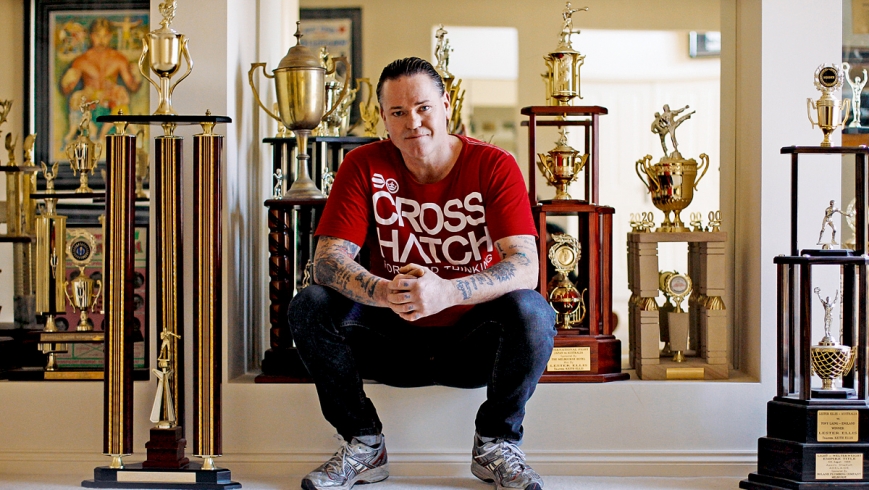It’s both a gym and a wander through the glory years of a man’s life.
Inside the tiny room within the grand Taylors Hill home, among the gym equipment and punching bags, mementos from his halcyon days line the walls: images of a champion, framed articles charting the path of the boxer who became a nation’s hero at just 19.
If the Lester Ellis Fitness Academy had a waiting room, this would be it. Suddenly, the former king arrives nursing a cup of morning coffee.
“Sorry for keeping you waiting, I’ve just woken up,” he says, a little bleary eyed, offering a hand. His grasp is firm but not the white knuckle variety you’re expecting from a former world champion. These days, 10 years after his final fight, Lester Ellis is knocking blokes into shape, rather than knocking them out, at his home-based fitness school. And today he’s going to teach the Weekly a lesson.
“I’ll get you on the pads and I’ll see what you’re capable of,” he says, taking a long slurp of his coffee.
The Weekly nervously inquires what kind of shape he’s in under his blue hoodie and jeans.
“Even though I’m not fit, I could box three rounds because I know how to relax, I don’t waste any energy,” he says. “When I was goin’, it was 15 rounds, yeah? I fought that three or four times, 15 rounds and, mate, it’s a long way.
“Boxing isn’t so much a sport, it’s life and death. If you’re unfit you can be killed.”
We step outside to strap on the gloves. The Ellis patio boasts a standard-sized boxing ring, with three boys following in their legendary father’s footsteps. You couldn’t expect anything less, really.
“Righto, let’s have a quick warm up,” Lester says, ducking his head as he slides between the ropes. This five-time world champion has fought allcomers over the years, from fellow boxers and the booze to his own demons, but to watch him dart about the ring is to see a spirit renewed.
He hands over a pair of yellow boxing gloves and we “shape up”, as they say, but the champ quickly realises he’s got his work cut out. After an awkward combination of jabs and wonky uppercuts it becomes apparent the Weekly’s left couldn’t pop open a bag of chips, and we break.
The conversation drifts towards his son Jake, who’s shown promise in the ring, but we learn that, curiously, his gold medallist father can’t, and won’t, coach him.
“I’m the best trainer for my son, but father and son doesn’t work,” Lester says. “So I’ve put him with somebody completely different that he doesn’t really know and respects and listens to.”
While Jake’s physical attributes might be similar to his father at the same age (“He’s a freak … he’s 57 kilos and he’s six foot two”), Lester fears his son might be a reflection of an Australian boxing scene with a paucity of “hungry fighters”, who lack the one essential tool every fighter needs: mongrel.
“I came from a commission area and a broken- up family. We had no money, we were doing it hard” Lester says. “I was no good at school, I was pretty much illiterate. But through boxing I wanted to read about the world champions and how they were guided and got motivated and what they did to become better, so I became a better reader. It was grouse.
“But I had a bit of mongrel, I had a bit of hate there, I wanted to get somewhere. I had desire. I said to him [Jake], ‘What do you want to fight for?’.
“He said, ‘Dad, I love it’. I said, ‘That’s not enough; if somebody’s trying to kill ya, it’s not good enough’. You need to have that mongrel. You’ve gotta have that hatred.”
Squatting down low and bouncing on the balls of his feet, Ellis recalls how he was first floored by the boxing bug.
He was 12 and had no interest in the sport until Rocky came out in the late ’70s and he stole some bottles from a local shop, just to scrounge up enough money to watch it. “I come out and I thought, bloody hell, how good was that? Eight years later I ended up being a world champion.”
The next lesson is all about evading the knockout punches, and Lester’s dodged a few in his 48 years. It’s probably why his work with the academy has helped change lives; he’s essentially a counsellor with a killer left jab.
“I’ve had people come in who’ve been picked on at school, very overweight. One kid was 120 kilograms and I got him down to 60. It took me six months,” he says. “He’s a different kid now. Good at school, got his licence, confident, know what I mean? Fixed up his life, got a girlfriend now.”
He says there’s no magic secret to good health, just hard, training and watching what you put in your mouth – ironic considering his past battles with the grog.
“It’s a daily battle. Today, I choose not to have a drink, but tonight I’ll have four,” Lester says.
“[But] I don’t get drunk like I used to and carry on. I don’t drink during the day, as a rule.
I don’t go out. I’ve got four beautiful kids, I’ve got a grouse wife who supports and understands me.
I just try to appreciate that every day.”
He says his life is proof that any problem can be solved if you try.
“If you’re physically well and strong, you think better. But when you’re unfit everything’s a f–k up,” he says.
Why then did his life fall apart despite his peerless physical fitness? “I don’t really know. I used to have hang-ups over my mother, bad hang-ups. She pissed off when I was five with Dad’s best mate.”
As we shape up once more, Lester admits he should have given the fight game away a lot sooner.
“I’ve been in some wars. I’ve got one damaged kidney. You forget things now and again but you come good. Nah, I’ve had my day, mate. Everything comes to an end, nothing last forever … hands up, mate.”
Academy inquiries: Sharon Ellis, 0419 891 758.







